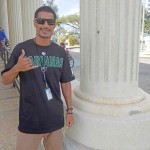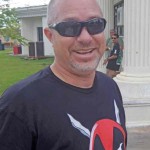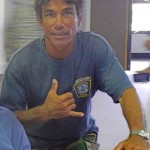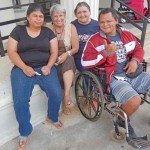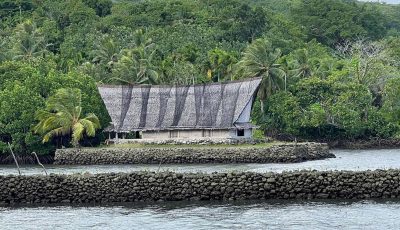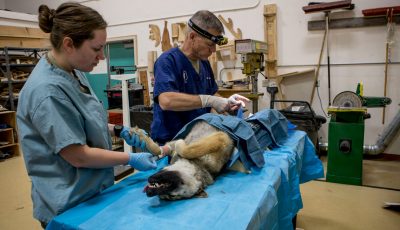‘Helping others in recovery helps my own recovery’
- A.J. Mettao currently works for the Community Guidance Center as a peer support technician and is looking to lead a potential new program for “Vets to Vets.” A veteran himself, Mettao is in recovery from a drug addiction and post-traumatic stress disorder for which he admits that helping others serves as a good tool for helping himself. (Contributed Photo)
- Greg Borja currently works as a projects specialist for he Northern Marianas Protection & Advocacy Systems, Inc. and is chairman of the State Behavioral Health Council. He joined the WRAP training to hone his skills in supporting others, but admits too that he is always looking for tools to help himself with his own substance abuse disorder and what he calls his IED…intermittent explosive disorder. (Contributed Photo)
- Brett Halstead recently got his boat captain’s license back and is in his eighth year of sobriety after a run-in with law enforcement due to, in his own words, decisions he made during the height of his addiction. He joins the WRAP training in part because he has a friend with schizophrenia for whom he’d like to be of more help. (Contributed Photo)
- Michael Torres joined the WRAP training because he likes being with his peers. (Contributed Photo)
- Kaye Christian, second from left, a long-time advocate for individuals with mental illness, surrounds herself with her peers to make the point for anyone going through struggles with their behavioral health that “you are not alone and that being with peers and being a part of trainings like the WRAP is a wonderful way to achieving and maintaining recovery.” Also in picture, from left to right, are Therese, Meredith and Felix. (Contributed Photo)
Participants in this week’s Wellness Recovery Action Plan training share a common bond of being individuals living with mental illness, or substance abuse history from which they actively seek to recover. Overwhelmingly, too, they share a common sentiment in the idea that helping others is in fact a good tool for helping themselves.
A.J. Mettao, who is in recovery from a drug addiction and who joined the WRAP training this week, said: “Maybe it’s a little selfish of me to think this way, but helping others with their recovery actually helps me in my own recovery. So, I’m here because I want to develop tools for helping my peers and because it helps me too.”
The notion of a combined training in peer support for recovery from mental illness and drug addiction seems to highlight what in recent years appears to be a blurring of the lines between mental illness and drug addiction.
In fact, “research does suggest at least a 60 percent rate for co-existing disorders in treatment programs. And professions have started to include substance abuse counselor training with mental health competencies, and mental health training with substance abuse competencies” (NAMI-YOLO). Sadly, we know that drug use “can sometimes give rise to symptoms that, over time, lead to a diagnosis of mental illness, but it is dangerous to conclude that drug use caused a mental illness” (Dr. Porteus).
Ultimately, whether we’re talking about mental illness or drug addiction, the point is that recovery is possible and made just a little easier when we can draw on the strength and experiences of those in recovery themselves.
“It’s much easier to open up to, share, and listen to others who have been or are going through what you’re going through,” Mettao said.
“Peer support is a supportive relationship between people who have experience in common. In this case, the experience that individuals or groups have in common is in relation to a mental health challenge or illness. This common experience might be related to their own mental health or that of a loved one. So, family-based peer support recognizes the struggle that members in a person’s circle of support experience in relation to the mental health challenge or illness of a loved one.”
Brett M. Halstead, another participant in the WRAP training who is also in recovery from a drug addiction, made the point that, “Mental illness and drug addictions don’t discriminate on the basis of class or status or anything else for that matter in our communities—so even our lawyers, judges, politicians and any other person in our community could be living with a mental illness and/or drug addiction. Trainings like this give us important tools to be able to help others and to help ourselves in the process.”
For more information on the WRAP training and/or Peer Support Worker training, contact any of the DNP partners including, but not limited to the Northern Marianas Protection & Advocacy Systems, Inc. at (670) 235-7273/4 or at www.nmpasi.org; the Council on Developmental Disabilities at (670) 664-7000; University Centers for Excellence in Developmental Disabilities at 234-3690. (PR)



